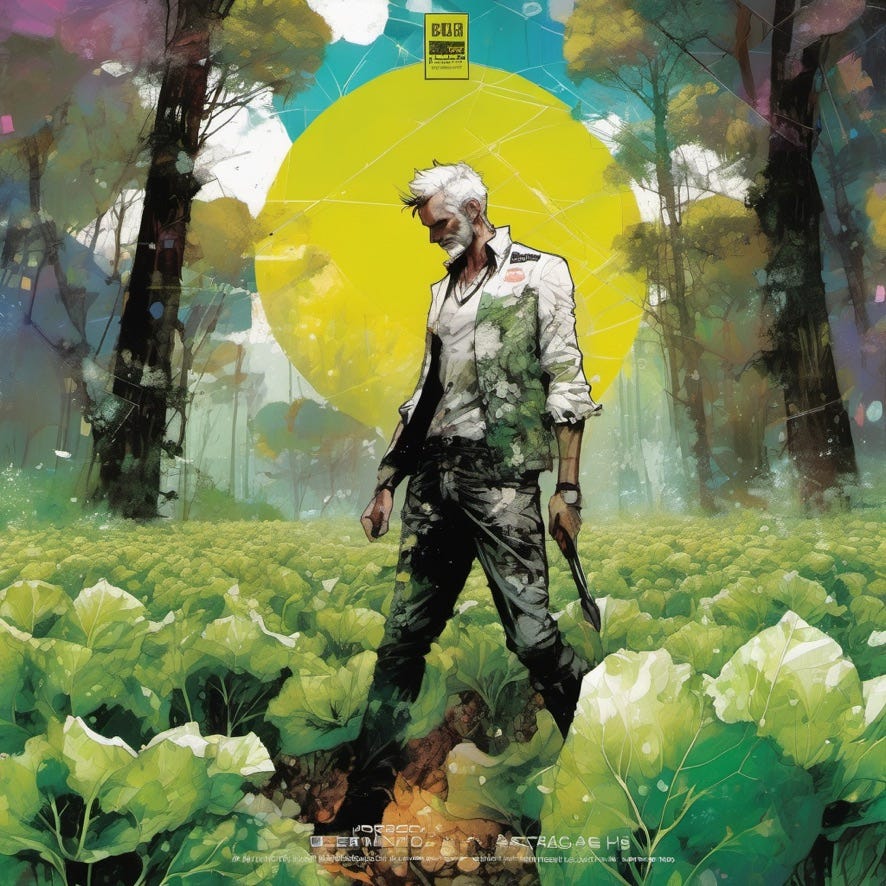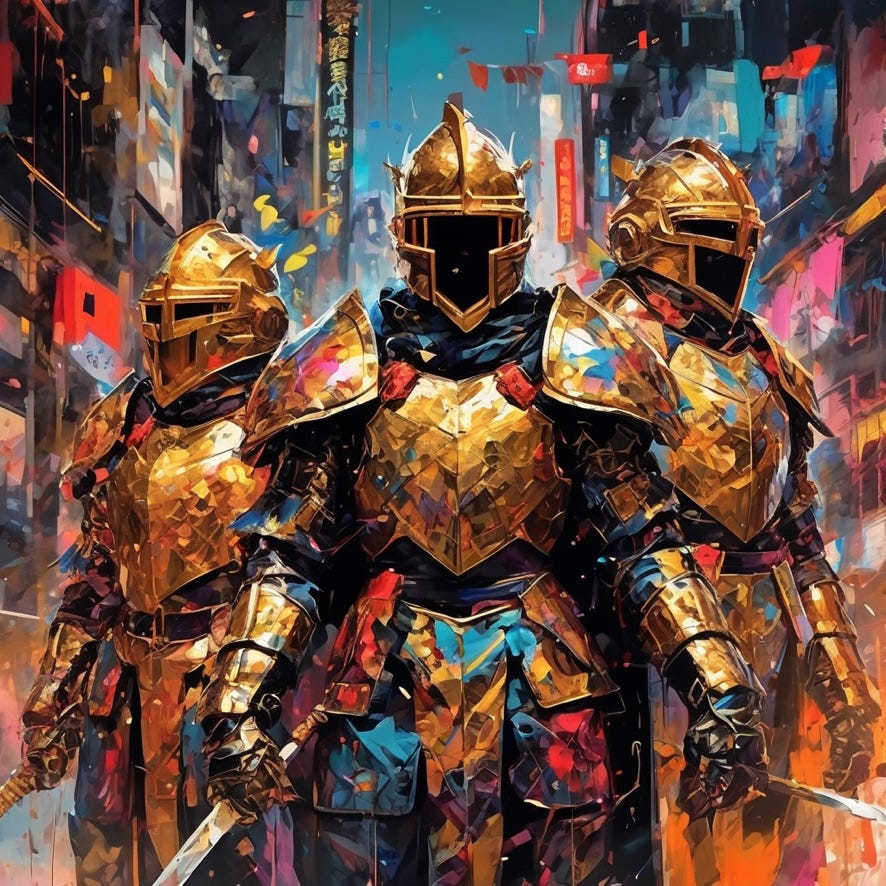On Writing Fiction
What Good is It?
I have wanted to be a fiction author for as long as I can remember. Throughout my life there has been no question about this. All my other published works were undertaken with a promise that “someday” I would write the stories I’d been dreaming about since childhood.
Like so many other things, this was called into question in 2020. Waking up from mass formation psychosis meant a number of things, but it quickly became clear to me that up to that point in my life, “dragon stories” had become my preferred form of escape idolatry. Idolatry, no matter the form, is the crutch of self-imposed slavery.
But thanks to the wake up call, I was on a newfound quest for self-ownership. I was on a crusade to put my skin in the real game. I intended to stand amidst the ruins of the world, and not wallow with those who have no hope.
As a result, I had to not only ask whether or not I should keep indulging in such stories, but, more so, what business did I have writing them? In a battle against the fragile, and in pursuit of the substantial, what place is there for the “novel”?
I needed real answers. This hunt was imperative. Fiction? What honest good is it?
Tall Tails and Fibs of Fortune
I remember an argument I had during a holiday dinner. I cavalierly suggested that all fiction is a kind of acceptable lie. As a self-styled fiction writer, I saw this trifle as a clever teaser, not the drastic moral pronouncement an extended family member took it to be. At the time, I thought, “methinks she doth protest amuch,” but post 2020 I’ve been on the hunt for a better answer than jibes and dismissals: truly, what makes a fiction story “not a lie”?
How can we justify such things? Or should we at all? What makes bedtime stories that are not histories “good” or “ok”? What makes histories different? How wise is it to dream about fairies and dragons? How foolish is it not to dream?
In any case, if I personally was ever going to write stories for popular consumption, I needed something more than an appeal to carnal nostalgia to sway me to the task.
The Answer?
There is no such thing as fiction.
To understand, remember that, outside of the Bible, all writing is a matter of human perspective. Winston Churchill’s The Second World War is a monumental masterpiece, a detailed account by a man who lived it. Eye-witness testimony.
But just because someone remembers it does not mean it is true. Churchill remembers the war the way he wants to remember it. Bias is the linguistic challenge mankind cannot escape. Historians who criticize Churchill are, too, subject to skew.
Deciding what to write and what to omit, what to say and what to leave unsaid, always impacts what is heard. Hard scientists and mathematicians go to great lengths to overcome this limitation, but they are still subject to their passions, limited by their assumptions, biased toward their own point of view, and, especially, limited by the scope of their studies.
This does not mean that knowing history or algebra or anything else is impossible. It only means that such things are constructed within a realm that is rife with speculation. The most honest man developing the most honest assessment of the most observable reality will always still be limited by what he is able to see. What he cannot see is beyond him, and, may, in fact, later, change everything.
All this is to suggest that there is not a fundamental difference between history, math, science and fiction. The differences which do exist are a matter of nuance rather than of substance. In every case of writing, whether an analytical physics research paper or a poem about your purple frog, the important question is not, “Is it true?” but “What does it mean?”
Symbols are Real
You might not be able to find a hobbit hiding out in the bush behind Cambridge, but hobbits definitely existed there in the mind of their author, and so also in our minds too. In telling stories about hobbits, J.R.R. Tolkien did not expect you to pull out stethoscopes and tape measures, but to sit back, relax and consider the implications of his story. The dragon named Smaug did not “actually” exist, but the impact of his mind, his morals, his means and his ends most definitely do.
When Jesus told the parable of the sower, it did not matter whether or not he had a specific sower from the tribe of Naphtali in mind.
What was the sower’s name? Under which king did he live? These are stupid questions. Jesus did not care about “the facts” but “the story.”
Every novel is a commentary. Every story is a metaphor, as reliable as any random science claim or historical assertion, so far as it goes, for communicating truths about life.
Escapism and addiction to entertainment are certainly a threat within the present times. How useful is the fifteenth book about the warrior princess dragon rider who fights off hordes of gumbleboblins with her magical scrunchy? Does that romance novel really enable you to better love your husband, your children, your God? Why are you wasting your time on what does not matter, does not satisfy and may indeed be a threat to your immortal soul? These are imperative questions.
But lies do not lurk not in the notion of story itself. The evil lies in our atrophied discernment.
“A man went down to Jericho…”
“In a hole in the ground there lived a hobbit…”
“Sit back and I’ll tell you a tale…”
Pay attention to a yarn, and you stand to learn a thing or two.
Slay the Demon
We stand at the climax of a fantastic battle in which the self-destructive parts of your soul wage war to talk yourself out the beautiful things you long to do. It doesn’t have to be about writing. It’s any art, any hope, any effort to improve what you do, that you then (quietly and desperately) shout down in your own heart long before you give yourself permission to try.
This is because success is emotionally dangerous. Success is change. Change scares your inner critic, the part of your soul that is made for seeing flaws. The inner critic is necessary for survival, but when leveled against your neighborhood, your family, your heart, criticism is a harsh master.
No one wants to work for a harsh master, especially not your story.
Leveled against yourself, self-criticism is the root of procrastination and paralysis. It is a true cowardice, built of excuses, founded on fears and told as imagined, scary futures, in order to stop the future from getting better simply telling the stories you’ve always dreamt of telling.
It wasn’t in the cards. It’s out of my league. I just can’t do it right now. I need to…instead….
Your brain is not your soul. Your thoughts impact your heart, but your heart is way more than the sum of your thoughts. They work in the same body, but they are not always on talking terms. To discover that place of communion between your soul and spirit, your own stories compel the tenor of inner self talk to expose itself on the page in all its glory.
It is not always easy to like what you find.
It is also easy to let the critic tell you not to like what you found, even though you like it very much, and others will surely like it too.
Self talk, when it gets nasty, is best not tolerated. Cut it off.
I know the game my flesh plays. I know the corrupted path of delay and subtle avoidance all too well. For all of my successes, there are more incompletes, barely starteds, and maybe-somedays gathering dust in my guilty conscience than my guilt conscience wants to face on any given morning.
It is on these foundations that I suggest the following:
Acknowledge to yourself that your story is symbolic expression of your own inner struggle to come to terms with your soul, especially the most pained and fractured parts, which themselves do not wish to be brought to light, but also know that they must if they are ever to heal.
The child wants to write. The dreamer wants to fly. The hurt wants to hide.
Writing is always a manifestation of your present, psychological load. Writing stories is a means of unburdening that load without the need for introspection, direct assault or psychoanalysis. To face down all the many pained and patterned pasts that you’ve spent a lifetime papering over, fiction, written and read, is the action of a dispirited soul seeking to make peace with the body it was born in.
The ink of your own new story won’t let you hide from this. Your writing about what you know will inevitably expose it. Even if you can’t see it, a well trained reader will.
For these reasons, you cannot pretend to write. It is not like scrapbooking. It is more like carpentry. Or Jiu Jitsu. Or coloring with crayon.
You can only be who you actually are.
You will always intuitively write the book that most frees you. But you will also see that this means terrible, adventuresome freedom on the other side of dynamic, even epic, change, and your chancy soul will sabotage every one of your half-hearted efforts to prevent such an exhilarating, (and, now, successfully out of your control) world from descending upon your safely constructed urban myths of psycho-consumptive-Babylon.
To Conclude
Unaddressed struggle with your soul is likely the main reason you want to write fictional stories in the first place, and, therefore, the main reason you have not finished them yet. Fiction stories are the dark dreams and enlightening fears born of our overwhelmingly modernized hearts. Because the real world is too terrible to possibly explain, because there is so much we just don’t know how to face, because some giants are too titanic to contend with, fiction wraps up the war for your heart in the best symbolic tongue your waking mind can absorb.
I do not believe this is either bad or good. I believe it is the way that it is. Thereby, I also believe you will be much better at writing fiction when you know that the effort to exorcise your soul is what you are doing.
Ask Jesus for help.
Out loud.
I am afraid of finding out how my stories end. That’s why I haven’t finished them. I could jot down, “Happily ever after,” or, “oh no! Tragic flaw!” and be done with the cookie cutter. That might be good enough for some, but it is not good enough for me because I know that a fake ending won’t do for my heart. I’m a hungry man. I’m after more.
My battle against my own disappointment with myself, the longest living memory of awareness that I have, self-hate, uncovers itself not only in what I write, but as I write. It is either then that I listen to my critic, and let it reign, or I cut it off in Jesus’ Name, grab for the exposed roots of those childhood rawnesses that revealed themselves in the scrap, and dig with the discipline of knowing that a worker is worthy of his wages and our God is the one who justifies all things.
Writing fiction puts flesh on the demon precisely so that you can slay him.
Sometimes I think teachers make writing complicated so as to make it complicated to near impossible to join their network of elite satrapies. “English 101!” they say, and the rest of the world flees in terror.
So, in order to save you from I know you were told by their their lying, thieving, brainwashing, soul-sterilization techniques, here is the English 101 version of what I said above:
Your story is not about a theme.
Your story is about a plot.
Your plot is about the characters.
Your characters are about their dialogue.
Your dialogue is the manifestation of your soul.
And, the take away…
6. If you don’t know what’s in your soul, you will sabotage your work in order to avoid finding out what’s there.
The solution? Finish the book! Slay the demon. The skeleton in the closet isn’t alive but it is blocking the secret door, the other side of which contains refreshments beyond all of your wildest dreams.
You wanted an adventure, did you not?
All the other stories are from the devil, anyway. In the Name of Jesus Christ, it’s high time you write your own without fear of shame.
So go do it. Again. You have what it takes.












This is absolutely inspiring! I, too, have always wanted to write fiction. I still have a full, wide-ruled notebook tucked away somewhere that is filled with my 2nd grade handwriting (and 2nd grade level spelling) about a lost kitten that is found and loved by someone. I wrote my only finished novel throughout my 14th year and felt so satisfied with the completion. It was about a young girl dealing with the cancer diagnosis and death of her aunt. I had not seen at the time that I was probably writing through the feelings I had about the death of my grandfather from cancer years earlier.
I spent my teenage years composing and writing songs which were, essentially, poems. I miss how easy those used to come to me. I remember when a shift happened and I got married. And I suddenly didn't want to write songs anymore because I felt too exposed; I didn't feel like I could share new words anymore because they always involved feelings and now my feelings might be overly inspected by others and involve other people too. I didn't like that. I'm still trying to navigate through that now as I still long for original music but my life has extended into a husband and many children and it's hard to spend time creating something but keeping it to yourself. My life is also in a very full season that those times of many hours to linger over words and tunes are very shortened.
But back to the fiction writing, I've found myself starting many things through the years when the inspiration strikes. But I have yet to finish any more novels. One way I have found satisfaction though is creating stories on the fly for my children. Their attention is so fully captured by stories that I feel a responsibility in how I handle them. It's become a beautiful part of our lives.
I have been reading through Charlotte Mason's home education series this year (we homeschool) and her writing also inspired me toward good stories, both my own and those of others.
I've contemplated a topic recently about the need for stories. I'm sure I won't explain it as well as I received it but I want to share in case it strikes a thought. God created the greatest story of our redemption. He gave us a longing for this. Every good story there is has some element of the gospel. Even non-Christians can feel this pull toward good stories. Self sacrifice, redemption, growth, love, the unlikely hero, forgiveness, belonging, healing. The list that we can create with elements of the Good News really seems endless. Another thought that I heard in regards to fairytales and children, is that we, even from childhood, long to see evil defeated, conquered, killed. I see it in my kids that these are the stories they long for most.
I think back to even my first stories like the little girl finding the lost kitten. Even in that little story written by a young girl, the longing for the lost and scared to be held and loved is there. The climax of the story is belonging, loved, held on to, and realizing you are not alone in this world. Stories capture the heart is simple and satisfying ways. And the best ones mirror the greatest story God has given us.
Thanks Fisk, this is a similar question I face with Game Development. My soul wants my game made but there is a long journey in making it. Im learning a lot about words as my game is avoiding them completely. How do you send a message without language? What is intuition? Is programming a creative language that speaks math into function? Can you speak using mechanics? Does the world need more games? Am I creating another waste of time? Why am I making it?
Absorbing Ecclesiastes, has taught me to simply find pleasure in the process, the demon hunting and the learning.
What Jesus does with the finished project is up to him.